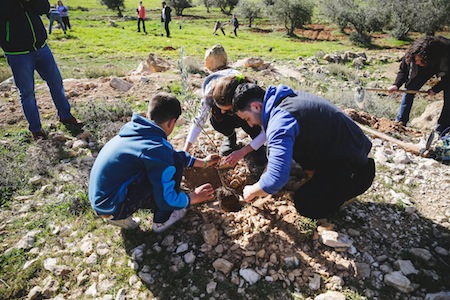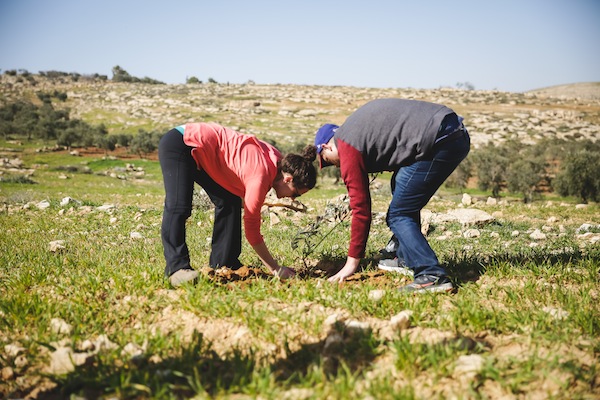T’ruah students help plant trees in the Hebron Hills. (photo from T’ruah)
U.S.-based T’ruah: The Rabbinic Call for Human Rights works in Jewish social justice circles in Israel and North America.
“We work with human rights of both Israelis and Palestinians…. We’ve also worked on introducing rabbis and rabbinical students, and also congregations, to what’s happening in West Bank and more,” executive director Rabbi Jill Jacobs told the Independent.
T’ruah, which supports a two-state solution, offers the Year-in-Israel program for rabbinical students.
“Students study in Jerusalem at various institutions,” said Jacobs, “but they don’t necessarily get to see human rights issues up close. We take them once a month to see a human rights issue on the ground, either in the West Bank with Palestinians, in Bedouin Israeli communities in the Negev, asylum seekers, etc.”
At these sessions, students meet with Israeli human rights and other leaders on the ground. The program is held during students’ free time, separate from their regular studies.
“The goal of the program is to help them develop a rabbinic moral voice,” said Jacobs. “As rabbis, they’re going to be called on to speak about Israel. The question is, how do they talk about Israel as a rabbi? Rabbis talk out of their values, and also are generally dealing with politically diverse communities…. So, the question is, how can a rabbi speak in a way that will push people to listen to perspectives they might not otherwise listen to, [based on] Jewish texts and Jewish values?”
Jacobs recognizes that the information they provide is not comprehensive. Their focus is to give students the opportunity to interact with human beings – to meet Palestinians, Bedouins and others and learn from them what their life experience is like.
“It’s also crucial to us that they are meeting with Israeli human rights leaders,” said Jacobs. “Very often, there’s a dichotomy that suggests that being pro-Israel means supporting the right-wing government of [Binyamin] Netanyahu and that being pro-Palestinian means being against Israel. We’re pro-human rights and we want them to meet Israelis working every single day to push for human rights in their own country because they love their country. We want them to see that there are actually people who are changing the situation.

“We hear a lot from the students that our program gives them hope. Sometimes, they are so hopeless about what is happening in Israel and then they meet people, both Jewish and Palestinian communities, who are trying to change their situation.”
One T’ruah graduate is Rabbi Philip Gibbs, spiritual leader of Congregation Har El in West Vancouver.
“During my year in Israel, during my second year of rabbinical school, I had the opportunity to then be a fellow with T’ruah for their rabbinical student program,” Gibbs told the Independent. “I really appreciated the opportunity, both because, at least the year I was doing it, there was clearly a huge focus on the Israeli-Palestinian conflict. But, also because the way, in terms of educating about social justice issues in Israel, they were able to show some of the other issues happening – whether it was meeting with Bedouins, talking to some asylum seekers from Africa … really seeing what their home-grown needs are and seeing how it developed into a strong sense of the how they were fighting for many of those needs through the legal systems in Israel.”
Gibbs met with Palestinians who had been displaced from the Jerusalem area after the 1967 war. “We had the chance to hear their narrative,” he said, “highlighting how their status as refugees during that conflict had really come into question because of both the policies of Jordan, as they were occupying the area, as well as some of the motivations of different settler organizations in their attempt to create a much stronger Jewish presence behind the Green Line… I felt like that was more educating us in understanding the way that the nature of a lot of these neighbourhoods had been going back and forth.
“For the Israeli settlers, they felt they were reclaiming a neighbourhood that was Jewish. For the Palestinians that had been living there, their legal status was caught up in layers of legal confusion of having that area under control of many different authorities over the past 150 years.”
Gibbs has not yet had an opportunity to bring this part of his rabbinical education to his congregation directly, but it has definitely played a role in how he shares his perspective regarding, for example, the upcoming Israeli election.
“I’m making sure there’s a deeper sense of having the recognition that a lot of these questions that are coming up, some of these issues are on the minds of most Israelis … but that, no matter what, a lot of the work that human rights organizations are doing, a lot of that is going through the overt legal system of Israeli government.”
Regarding the many Israelis he has met who work for human rights organizations, Gibbs said he appreciated the way their main motivation was a deep sense of trying to make their country the best it can be, noting that every government needs to be transparent in their treatment of their citizens, allowing for a certain amount of criticism.
“That’s something coming from a place of love and it’s the most ideal way to get things done in a constructive way,” said Gibbs. “People can debate about how much people living outside of Israel are supposed to be making any sort of direct intervention, which happens on both sides of the political spectrum, but, I think, there’s absolutely nothing that we should hide in terms of understanding the full array of political work happening in Israel.”
Rebeca Kuropatwa is a Winnipeg freelance writer.

